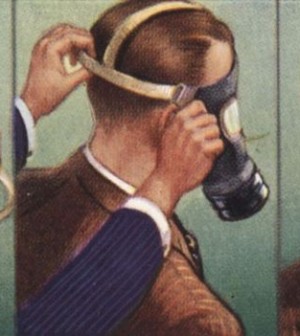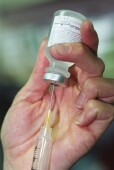- The Best Time of Day to Drink Bone Broth to Maximize Health Benefits
- 8 Ways to Increase Dopamine Naturally
- 7 Best Breads for Maintaining Stable Blood Sugar
- Gelatin vs. Collagen: Which is Best for Skin, Nails, and Joints?
- The Long-Term Effects of Daily Turmeric Supplements on Liver Health
- Could Your Grocery Store Meat Be Causing Recurring UTIs?
- Are You Making This Expensive Thermostat Error This Winter?
- Recognizing the Signs of Hypothyroidism
- 10 Strategies to Overcome Insomnia
- Could Artificial Sweeteners Be Aging the Brain Faster?
Blacks Respond Better to German Measles Vaccine, Study Contends


Black Americans respond better to the rubella vaccine, which prevents German measles, than whites or Hispanics, according to a new study.
Researchers said their findings could lead to more effective vaccines that target specific groups or individuals.
“We don’t know why these groups reacted so differently to the vaccine — that’s a subject for further studies — but this new information will help us as we design the vaccines of the future,” said the study’s senior author, Dr. Gregory Poland, a vaccinologist with the Mayo Clinic in Rochester, Minn. “It will ultimately change how we practice medicine.”
The study, published Feb. 26 in the journal Vaccine, involved 1,100 healthy children and young adults in Rochester, Minn., as well as 1,000 recently vaccinated members of the U.S. Navy who acted as a control group.
After receiving the current rubella vaccine, Somali Americans developed twice as many antibodies to the virus as white people, the researchers found. Another group of non-Somali blacks had the second highest immune response to the vaccine, which was still significantly better than whites. Meanwhile, Hispanic Americans had the lowest immune response to the rubella vaccine.
“The significance of the findings is that in the future we may be able to create vaccines for specific groups or even individuals based on their genomic and other characteristics,” Poland noted in a Mayo news release. “That may mean adjusting doses for some or being able to treat larger populations with the same vaccine if the dosage is less.”
Although previous studies have suggested that women have a better response to vaccines than men, this study did not find that sex contributed to differences in the participants’ immune response.
Poland is the chair of a safety evaluation committee for non-rubella vaccine trials being conducted by Merck Research Laboratories. He also holds two patents related to vaccinia peptide research and advises major pharmaceutical companies, including Merck, Sanofi Pasteur, Dynavax, Novartis Vaccines and Therapeutics, and Emergent BioSolutions, on vaccine development.
The rubella vaccine is usually given as part of the MMR vaccine (protecting against measles, mumps and rubella). MMR is recommended at 12 to 15 months of age followed by a second dose when the child is 4 to 6 years old.
The virus causes a rash for about three days.
More information
The U.S. Centers for Disease Control and Prevention provides more information on the rubella vaccine.
Source: HealthDay
Copyright © 2026 HealthDay. All rights reserved.










